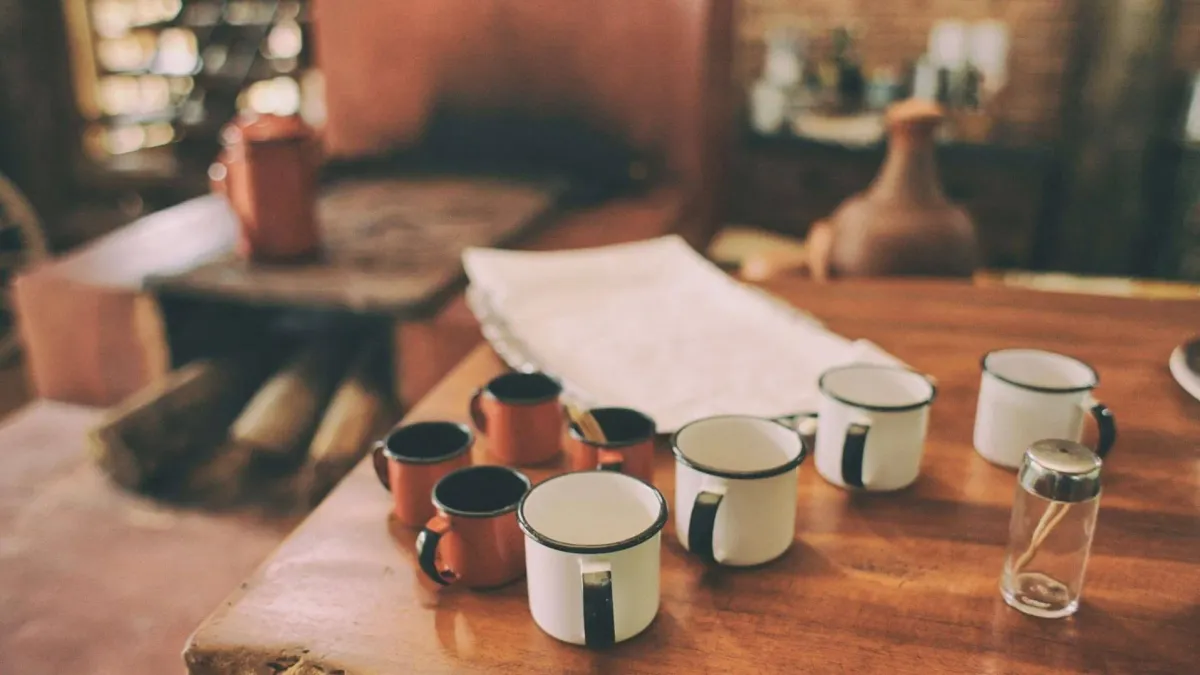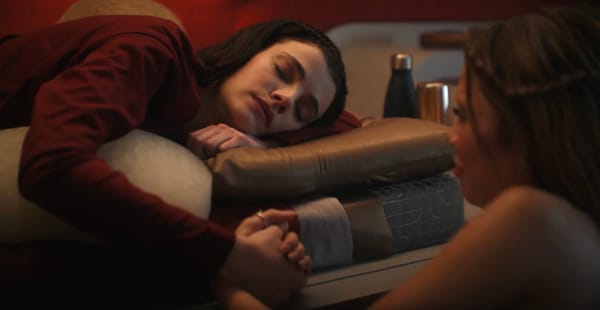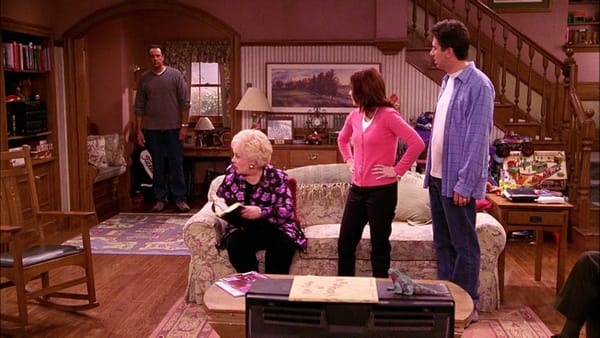Coffee hour
Or: How I found something to believe in

When I was a kid, church was one of the centers of my social existence. Most of my friends were at school, but as a lonely farm kid who took the bus home dutifully every day, the Sundays and occasional Wednesday nights I spent at church at least offered a bit of variety.
For most of my childhood, I went to a non-denominational church that boasted of its "pentecostal" qualities. People spoke in tongues and laid hands on each other in the name of healing. I grew up terrified of a supposed recording of Hell that Soviet scientists had made, which a church member brought up at a Christmas pageant to goose us into saving more souls. When I fell asleep at night, I clutched my favorite stuffed animals tight to my chest with one arm and my favorite pillows to my head with the other. If I was raptured, I wanted all of that coming with me. Never mind that I could have anything I wanted in Heaven; I would know any version of my favorite teddy bear for the fake replica it was. In time, my arms grew sore from sleeping like this every night. I didn't stop.
It was a bizarre, disorienting place for a queer girl to grow up. On the one hand, I learned to hate everything about who I was. On the other, when I was 13, I started kissing a boy I met at a different church (though one that was in the same evangelical tradition). He liked computer games almost as much as I did, and sometimes, I imagined he could see who I was through the disguise I wore for everybody's benefit. We would sneak into the woods behind the church after services and kiss chastely until adults nearly caught us. In the very same building, I was learning why I was evil for who I was and how to better become my extremely wicked self.
I stopped attending church when I left home and was no longer compelled to attend. I always intended to return, but the part of me that had found solace there felt so distant from the adult I was trying to be. In time, I also mostly stopped believing, though my terror at being sent to Hell took a long time to die off, a vestigial organ that still acts up from time to time. If you had asked me what I believed in 2017, a year before I came out, I would have said I was a deist. I didn't want to let go of the part of myself that had believed in God as a kid; I also found it hard to believe he cared about anybody in particular.
Something fascinating happened when I began transitioning: I wanted to return to church. I didn't know if I believed in any of what I would hear there, but I knew I wanted to find a place where I could think about mysteries larger than myself in a room full of people doing the same. I found myself attending an Episcopal Church in Los Angeles, one that was queer-accepting and one that was cool with me openly doubting many major tenets of the faith. Both of the current deans are gay men, and for a time, the church had an enormous "END GUN VIOLENCE" banner hanging outside, which led to it getting review bombed on Yelp. It's that kind of place.
The Episcopal church writ large not-so-quietly brands itself as a place for people who were hurt by the church as kids but remain Christian-curious to attend. (See also: many ex-evangelical queer people.) This implicit branding results in congregations that feature people of all ages, but in my church, at least, there are two rather large clusters of those in their 30s and 40s and those in their late 60s to their 80s.
And when I go to church, I'm often surrounded by more diversity of all kinds than I get in my day-to-day life.
I live in Los Angeles, one of the most diverse cities on the face of the planet. But my diversity often runs along a single axis of "people around my age in roughly similar life circumstances." That group includes plenty of queer people and people of color, but it's not particularly thriving with, say, college students or the elderly. When I go to church, I feel impossibly old talking to the former and impossibly young talking to the latter. It's a good dynamic.
Consequently, my favorite part of each week's service is the coffee hour after most services. We stand under a tent off to the side of the church and share coffee and whatever snacks someone brought that week. I talk to lots of people, of all ages, from all walks of life, with whom my everyday life would rarely intersect. We're all in the same space, often with the same doubts, trying to understand something bigger than ourselves.
Communities in the US used to be filled with organizations like this that acted as social glue. In the late 20th century, the evangelical church slowly but surely closed itself off to nearly everyone who didn't fit a specific brand of white, cisgender, heterosexual, patriarchal Christianity, pulling up an imagined ladder to heaven behind it. In the process, something lovely was lost.
I don't really think that "bring back churches" is the solution to anybody's problems. The church, both nationally and globally, is responsible for a tremendous number of sins. But I find more value in coffee hour than few other things I do each week. I still find myself doubting the existence of God, much less that he would care at all about me in particular. But I don't doubt the people I talk to each week for an hour after church. I have faith in them, and that's enough to have faith in something larger than myself, even if it's just a place where many are gathered in some other name.
Talk back to me: How many older people that you aren't related to do you know? And, no, I don't count. We don't know each other, and I am not that old. Tell me in the comments or by replying to this email!
What I've been up to: I talked to the head of an indigenous-centered film festival about the promise and shortcomings of land acknowledgment ceremonies. I also talked up country singer Carly Pearce's 29: Written in Stone, which I love.
It’s an album that looks backward — to Pearce’s parents’ marriage and to her country music foremothers like Loretta Lynn — and forward, to what Pearce might have learned from her divorce that she will bring to future relationships. It’s appropriately angry in places, appropriately grief-stricken in others, and appropriately relieved in still others. It’s an album written by someone who didn’t expect her relationship to end so quickly, but who’s also willing to admit it’s probably good it ended before she and her ex could have their lives further enmeshed.
What you missed if you're not a subscriber to Episodes: Jenna Dorn's piece on the role of retribution and restoration in the Batman canon made me think about Batman in a new way, which is... not easy, let me tell you. Lotta Batman takes out there.
In the final act of The Batman, director Matt Reeves's 2022 take on the venerable superhero detective, the sea wall surrounding Gotham City comes tumbling down, flooding the dingy metropolis. Batman (here played by Robert Pattinson) realizes that saving the day may mean something other than punishing a supervillain. Yet as he leads people out of the darkness, a single flare held aloft, it's not hard to see what might come after the flood as a chance to build something new. And the dichotomy between creating actual change and simply renewing broken systems lies at the core of Reeves's film.
Read me: My former A.V. Club colleague A.A. Dowd has a great take on how the underrated horror movie Unfriended is the movie that best captures our hyper-connected age. I love Unfriended!!!
A low-budget techno slasher named for Facebook lingo remains one of the few movies released in the wake of our mass virtual migration to muster any real perspective on it. Eight years ago, Unfriended silenced the groans of skeptical horror buffs (“oh great, another FeardotCom”) by turning out to be much more fiendishly clever than a logline or its moniker might suggest. Today, one could go further in describing it as an essential portrait of the 21st century — a thriller that captures not just how so many of us now experience daily life but the way that digital scrim has replaced the normal fabric of society, with empathy as a major casualty.
Watch me: Get hype for the new fall season when Alan Thicke explains to you the character web on Twin Peaks! (I can't believe this aired on TV. I miss the '90s.)
And another thing... I've been enjoying this Spotify playlist of great David Bowie covers, and I thought you might, too. In particular, I think it's impossible to make a bad cover of "Life on Mars," though my favorite might be this one in Swedish by one of the women from Abba.
Opening credits sequence of the week: I often use this space to goof on ridiculous credits, but the opening credits for the short-lived NBC '80s drama Stingray fucking rule. Hell yeah.
A thing I had to look up: Did you know that "Episcopalian" should only ever be used to describe a member of an Episcopal Church? I did not until I wrote this newsletter!
This week's reading music: "Mountaineer" by Spring Summer
Episodes is published twice per week. Mondays alternate between a free edition on various topics and a subscriber-supported edition where I recap TV shows of interest. Fridays offer pop culture thoughts from freelance writers. The Friday edition and the biweekly recaps are only available to subscribers. Suggest topics for future installments via email or on Twitter. Read more of my work at Vox.




